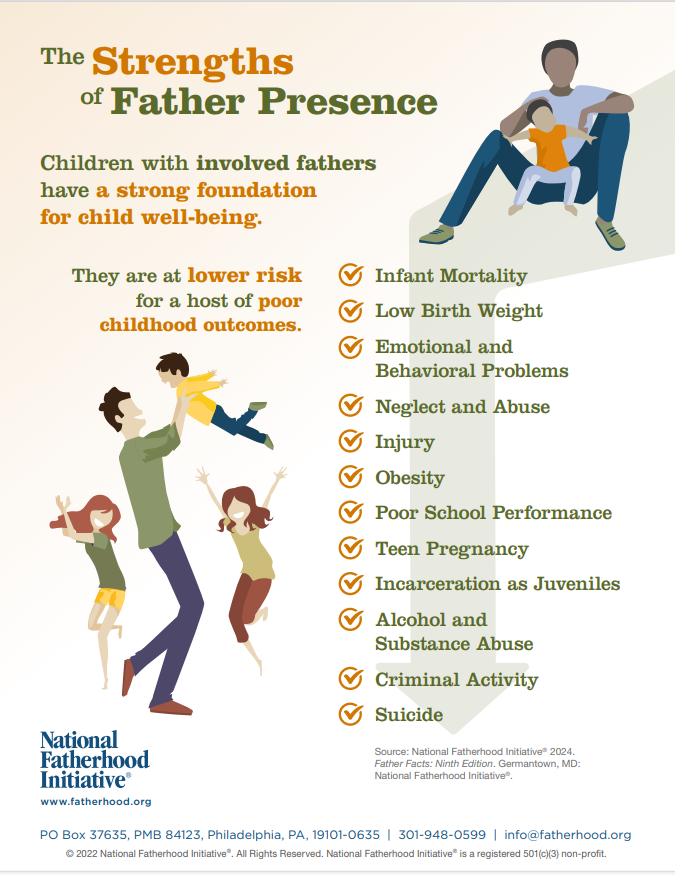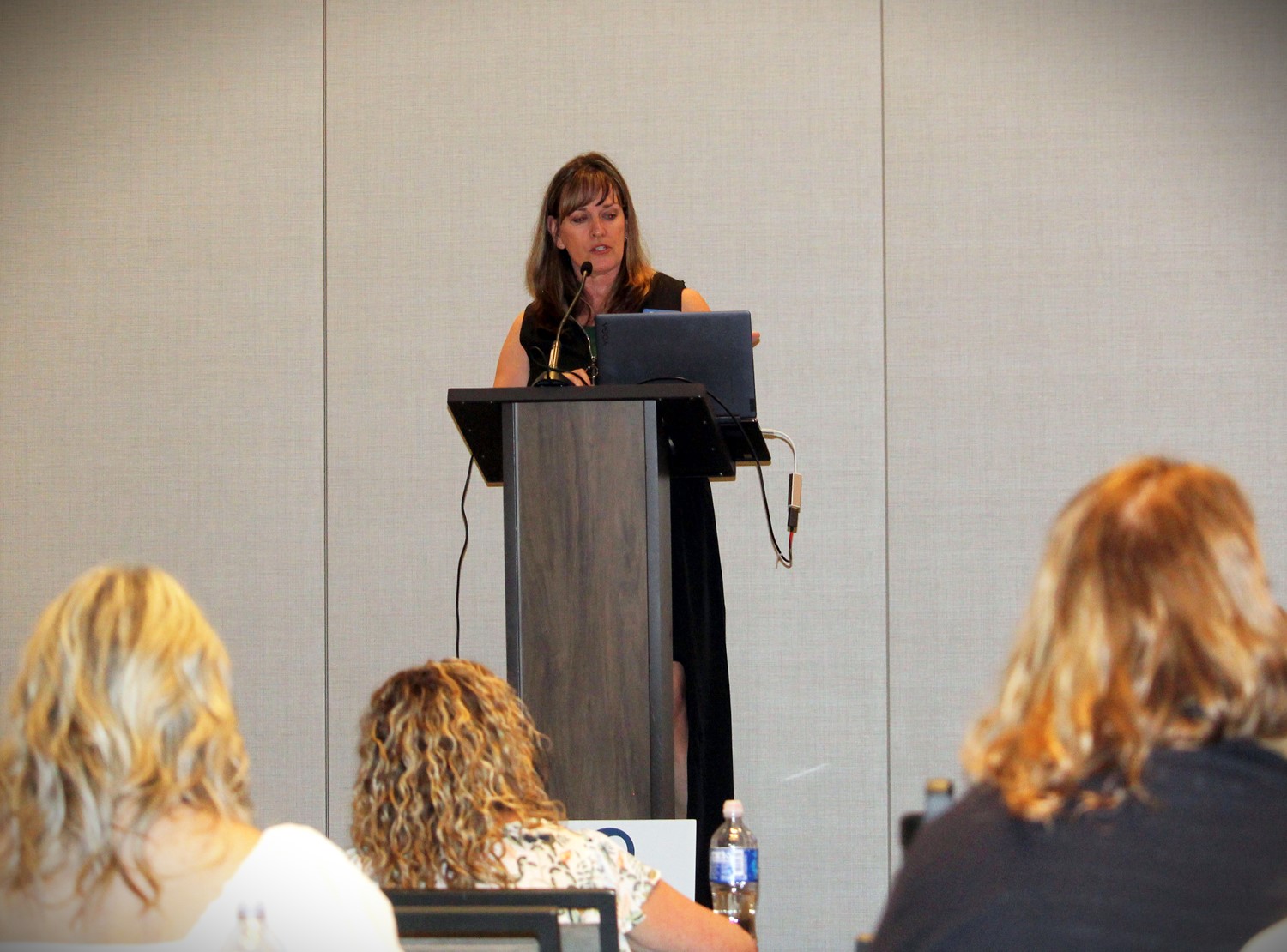Fathers play a vital role in the development and lives of children. Research, both secular and Christian, shows that truth. Pregnancy help organizations have been increasingly incorporating fatherhood programs into their services, and one center director outlined how she and her team reach out to young dads, enveloping them in education to help them be the best father possible during the 2024 Heartbeat International Conference.
The conference, held April 24 – 26, 2024 in Salt Lake City, included workshop sessions about welcoming men into pregnancy resource and medical centers, with at least three speakers discussing the topic. During the Wednesday afternoon, April 26 workshop, Father Friendly, Glendie Loranger, executive director of Life Services in Spokane, Wash., encouraged attendees to conduct a “father-friendly checkup” on their organization, asking four questions:
- What 3 physical factors about your center communicate that fathers are welcome?
- What programs do you include that are specifically for dads and how do you communicate that those are available?
- What do you do if a father comes to your organization looking for help?
- What language does your staff use that communicates fathers are welcome at the center?
She then shared how her center became ‘father friendly,’ which began with a parking lot encounter.
[Click here to subscribe to Pregnancy Help News!]
Genesis of program for dads-to-be
Not long after Loranger became the director of Life Services, she came upon a young man smoking a cigarette near his car in the parking lot of the center. She walked up to him and began a conversation. He was waiting for his girlfriend and in essence told Loranger he felt uncomfortable inside the pregnancy center. She set a goal to change that.
First, she said, the staff polled their female clients, asking one question: If the pregnancy test is positive, do you want the father of the baby to be involved? Nearly 80 percent of women responded ‘Yes.’ Then, Loranger and her team reached out to men in the community and asked them questions such as “What do you look for in a mentor?” “What kinds of things hold your interest?” “Where did you get your work ethic?”
“We wanted to know if our community could sustain something like this [a fatherhood program,],” Loranger explained.
Afterward, she and her staff began looking at already-established programs, including the National Fatherhood Initiative. However, no money was in the budget to begin the program, so a grant was written and submitted to a foundation located in the state. Although Life Services didn’t receive the requested funding, they were invited to re-submit after some “some additional research,” and the following year, that foundation awarded a grant to the center.
“Our new program is designed to connect a willing father-to-be with a strong father figure mentor, to connect that father-to-be with strong faith opportunities, strong relationship coaching, strong parenting tools, strong work ethic training, and ultimately strong, steady employment in the Spokane area,” Loranger said.

They hired a man, Mark Morton, to run the program. He was already working for Life Services. Sometimes God provides from those already known to the ministry.
“We hired Mark for 10 hours a week to be our facility manager, and his wife was our house manager,” Loranger said. “He was just one house down – he was right there all the time. So, ask God to give you one [an employee].”
Space was also needed.
“Lots of prayer went into this one,” Loranger told her workshop audience.
“We knew our guys were not comfortable coming into our waiting room, so we prayed about creating a space for them,” she said. “We needed a man cave. We looked at different offices in our building. All of a sudden, this little house that sat right behind our parking lot became available right before COVID hit. Literally, we were the last inspection before the world shut down. We planned to remodel it in nine months, and our nine-month remodel became a three-year remodel.”
Despite not having the house fixed as they originally planned, Loranger and her team opened the space for dads-to-be anyway. They completed the full remodel in 2023.
They chose the Fathering in 15 program from the National Fatherhood Institute and began seeking volunteer male mentors from churches.
“What we found was fatherhood became wildly supportive,” she said. “I could talk to a room like this about our clinic. I could tell stories. I could talk about post-abortion care, and I would get about half of the congregation paying attention. But the minute I said, ‘We've got a program that raises up young fathers,’ all of a sudden 100 percent are listening. People are hungry for this.
She added, “Men love the idea of giving to something that trains up and calls up other young men, and then out of that came a core of mentors within just a few weeks because what we found is we have a new-found volunteer role for guys. Before, men in the congregations or in our audiences would just tune us out, but all of a sudden, they're like, ‘Oh, I'd have a part to play in this whole life-abortion thing. I'm in! So, you have mentors who are just waiting for you to say, ‘We need you!’”
Although the curriculum is important, Loranger and her staff discovered the most critical element were the mentors.
“What we found is it had nothing to do with the curriculum and everything to do with the connection, the relationship that the guys have,” she said. “So, our gatherings became more about the connection and creating connection than it ever became about studying.”

Lessons learned
Connecting male clients with mentors remains one of the hardest tasks to accomplish. She and her team have learned several important things along this journey, including:
- Space and language are important – Both mother- and father-to-be should be included in conversation and body language and placement of furniture need to be considered as well as creating a less feminine room or space to talk with young fathers.
- A man needs to run the fatherhood program – Men understand one another and are more likely to open up to one another.
- Donors love fatherhood programs – It gives them ownership and “skin in the game,” Loranger said.
- Identify the end game for the program – For Life Services, the motto is “Healthy fathers raising healthy families in a healthy community.”
“Every time we have a new dad in our program, this is what we are guiding him to,” Loranger said. “Every single one is an individual and we treat him as an individual, but they need healthy communities around them.”
“We’re in it for the long haul because we address both mom and dad,” she added. “We’ve put a lot of prayer into this, and we’ve seen God work. We’re addressing all three people in an unplanned pregnancy – mom, dad, and baby.”
Unity and assessment are key
The conference theme, “United for Life,” helped conclude Loranger’s talk.
“It takes unity,” she said. “We really had to get our team on board first.”
All their efforts and endeavors made an impact. Last year, Life Services combined the motherhood and the fatherhood programs under one umbrella called Mentoring. The staff has seen an increase in the number of couples participating together in other programs and services and in attending church. More than 200 fathers-to-be annually have participated in sessions and gatherings each year, and the Life Services men’s program staff has increased as well.
She encouraged attendees to return to their centers with the four questions mentioned earlier and evaluate their organization and then to pose three more questions:
- What are we doing well?
- What are things we need to work on?
- What are some challenges we need to address?
“When it comes to a fatherhood program, it takes intentionality, it takes some gusto, and it takes a lot of prayer, and it takes the right people,” Loranger said. “But I believe … you have what it takes to be father friendly.”
Tweet This: When it comes to a fatherhood program, it takes intentionality, some gusto, and a lot of prayer.
Editor's note: Heartbeat International manages Pregnancy Help News.







